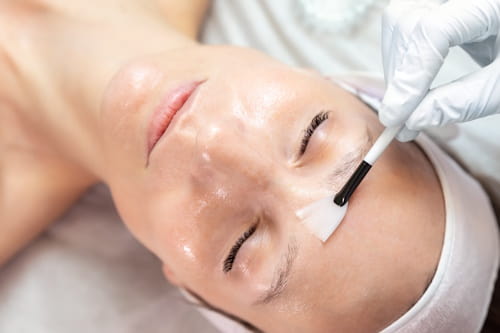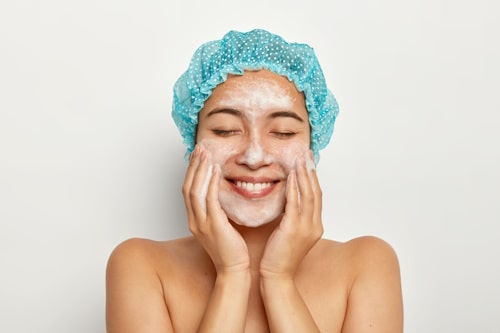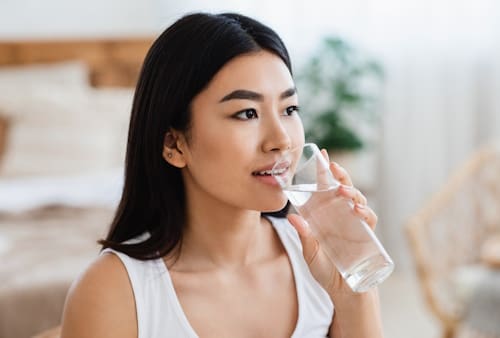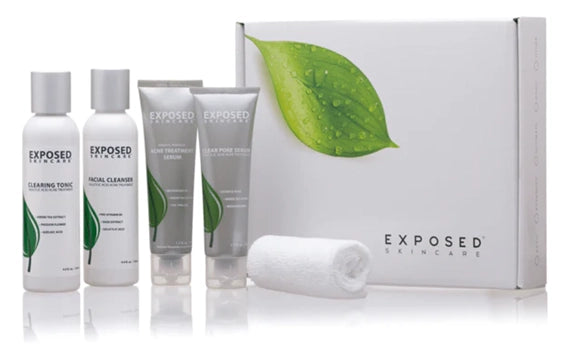Chemical peels are a popular dermatological procedure for rejuvenating the skin and addressing skin issues like hyperpigmentation, fine lines, and acne scars.
However, one common concern for many undergoing this treatment is the risk of developing cystic acne afterward. This blog post delves deep into understanding why cystic acne can occur after a chemical peel and ways to prevent it.
Also read: How to choose the best acne treatment
Biggest Take-Aways:
- Chemical peels improve skin texture and appearance but require careful post-treatment care to prevent complications like acne and irritation.
- The type of chemical peel used should match your skin type and concerns, with lighter peels for sensitive skin and deeper peels for more significant skin issues.
- Post-peel skincare should include gentle cleansing, hydration, and sun protection to maintain peel benefits and avoid adverse effects.
- Exposed Skin Care products complement the benefits of chemical peels, offering a supportive and effective regimen for maintaining clear, healthy skin post-treatment.

Understanding Cystic Acne and Chemical Peels
What is Cystic Acne?
Cystic acne, a severe form of acne, is characterized by deep, painful, and inflamed pustules on the skin. Unlike regular pimples or blackheads, cystic acne affects deeper skin layers and can be challenging to treat.
How Chemical Peels Can Trigger Cystic Acne
Chemical peels involve applying a chemical solution to the skin to remove its top layers. This process stimulates skin cell turnover and temporarily makes the skin more vulnerable to breakouts.
Understanding the link between chemical peels and potential acne outbreaks is crucial in adopting preventive measures.
Preparing for Your First Chemical Peel
Before diving into a chemical peel treatment, it's essential to understand how to prepare your skin to minimize the risk of post-peel cystic acne.
- Identify Your Skin Type: Knowing whether you have oily, dry, or combination skin can help tailor your pre-peel preparation.
- Select the Right Type of Chemical Peel: Different peels suit different skin types. For instance, glycolic acid peels are effective for oily skin, while lactic acid peels are gentler and better for dry or sensitive skin.
- Gradual Introduction: If it's your first chemical peel, starting with a lighter peel can help your skin adjust and reduce the risk of severe reactions like cystic acne.
Post-Peel Skincare to Prevent Cystic Acne
After a chemical peel, your skin is more sensitive and requires a specific care routine to prevent cystic acne and other complications.
Immediate Post-Peel Care
- Gentle Cleansing: Use a mild, non-abrasive cleanser to avoid irritating the newly exposed skin layers.

- Hydration is Key: Keeping your skin well-hydrated is crucial. Opt for non-comedogenic moisturizers that don't clog pores.
- Sun Protection: Your skin is more susceptible to sun damage post-peel. Apply a broad-spectrum sunscreen regularly to protect against UV rays.
Long-Term Skincare Strategies
- Regular Exfoliation: Once your skin has healed, incorporate gentle exfoliation into your routine to prevent dead skin cells from clogging pores.
- Use Non-Comedogenic Products: Choose skincare and makeup products labeled non-comedogenic to reduce the risk of acne breakouts.
- Balanced Diet: A healthy diet can impact your skin's health. Focus on foods rich in antioxidants and omega-3 fatty acids.
Dealing with Breakouts After a Chemical Peel
Despite preventive measures, some may still experience breakouts post-peel. Here's how to manage them:
- Topical Treatments: Over-the-counter topical treatments containing salicylic acid or benzoyl peroxide can help control mild breakouts.
- Avoid Picking or Squeezing: This can worsen the acne and lead to scarring.
- Maintain a Consistent Skincare Routine: Consistency is key in managing post-peel breakouts.

Advanced Tips for Preventing Cystic Acne Post-Peel
Beyond basic skincare, these advanced tips can further reduce the risk of developing cystic acne after a chemical peel.
Customize Your Peel Treatment
- Consult a Skincare Professional: A professional can help tailor the peel treatment to your specific skin needs.
- Consider Your Acne History: If you have a history of cystic acne, inform your skincare professional so they can adjust the type of chemical peel accordingly.
Balance Chemical Exfoliants with Nourishing Ingredients
- Incorporate Soothing Ingredients: Look for aloe vera, chamomile, or hyaluronic acid products to soothe and hydrate the skin post-peel.
- Limit Harsh Ingredients: Avoid using too many active ingredients simultaneously, as this can irritate the skin and trigger breakouts.
Long-Term Maintenance for Healthy Skin
Maintaining healthy skin after a chemical peel is crucial in preventing future instances of cystic acne.
Regular Skin Assessments
- Monitor Skin Changes: Keep an eye on how your skin responds to different products and treatments, adjusting your routine as needed.
- Periodic Professional Consultations: Regular check-ins with a skin care professional can help catch and address potential skin issues early.
Lifestyle Adjustments for Skin Health
- Stress Management: High stress levels can exacerbate skin conditions like acne. Engage in stress-reducing activities like yoga or meditation.
- Adequate Sleep: Ensure you get enough rest, as sleep is vital for skin repair and health.
- Stay Hydrated: Drinking plenty of water helps maintain your skin's hydration levels from the inside out.

Understanding the Role of Ingredients in Skincare
Key Ingredients to Look for in Post-Peel Products
- Alpha-Hydroxy Acids (AHAs): These help gently exfoliate and improve skin texture.
- Beta-Hydroxy Acids (BHAs): Salicylic acid is effective in treating acne and unclogging pores.
- Niacinamide: This ingredient can reduce inflammation and redness associated with acne.
Ingredients to Avoid Post-Peel
- Alcohol-Based Products: These can dry out and irritate the skin.
- Heavy Oils: Some oils can clog pores and trigger breakouts, especially in acne-prone skin.
Benefits of Using Exposed Skin Care for Acne Management
Exposed Skin Care offers a comprehensive approach to managing acne, especially beneficial for those who have undergone chemical peels or are considering them.
Here are some key advantages:
- Targeted Treatment for Acne and Acne Scars: Exposed Skin Care products are formulated to effectively treat acne and minimize the appearance of acne scars, making them a suitable addition to your skincare routine post-chemical peel.
- Helps with Skin Purging: The skin may purge after a deep chemical peel. Exposed Skin Care aids in this transition by helping unclog pores and reduce breakouts.
- Exfoliation and Removal of Dead Skin Cells: Products in the range contain hydroxy acids, which exfoliate the skin, removing the top layer of dull skin and promoting cellular turnover. This is essential for maintaining the fresh new look achieved by a chemical peel.
- Hydration and Treatment of Dryness: Many Exposed Skin Care products are designed to hydrate the skin without causing additional oiliness or clogging pores, addressing the dryness often associated with post-peel care.
- Safe for a Range of Skin Types: Whether you have chronic skin issues, suffer from acne, or have darker skin, Exposed Skin Care offers solutions that are gentle yet effective, catering to a diverse range of skin needs.
By incorporating Exposed Skin Care into your post-peel routine, you can enhance the peel's benefits, ensure better management of acne and scars, and maintain the health of your skin's dermis layer.
Conclusion
Chemical peels are effective treatments that can rejuvenate the skin's surface, unclog pores, and reduce signs of aging. The type of peel used can significantly improve skin texture and appearance.
Utilizing products like alpha hydroxy acids and beta hydroxy acids, chemical exfoliants in peels contain ingredients essential for promoting collagen production and improving the skin's turnover rate.
While there's a common misconception that peels are only good for specific skin types, there's a suitable option for almost everyone with a range of chemical peels available.
To maintain the benefits of a good chemical peel and treat acne effectively, integrating a well-rounded skincare routine is crucial. Exposed Skin Care, with its specialized formulations, can be a valuable addition to this routine.
These products work synergistically with the effects of chemical peels, helping to manage sebum production, hydrate the skin, and minimize the likelihood of post-peel complications.
Combining the right chemical face peel with a supportive skincare regimen allows you to achieve and maintain the radiant, healthy skin you desire.
FAQs
How Often Should I Get a Chemical Peel?
The frequency of chemical peels depends on your skin type and the type of peel used. Light peels can be done monthly, while deeper peels may require intervals of a few months.
Can Chemical Peels Cause Acne?
Yes, chemical peels can sometimes trigger acne due to skin purging. However, with proper skin care and precautions, this can be minimized.
Are Chemical Peels Safe for All Skin Types?
Chemical peels are generally safe for most skin types, but the peel's strength should match your skin type. People with sensitive skin should opt for milder peels.
What Should I Avoid After a Chemical Peel?
Post-peel, avoid direct sun exposure, use harsh skincare products, and pick at peeling skin to prevent irritation and damage.
How Can Exposed Skin Care Help After a Chemical Peel?
Exposed Skin Care products can help maintain the results of a chemical peel by providing gentle, effective skincare that manages acne, hydrates the skin, and supports skin healing.
















